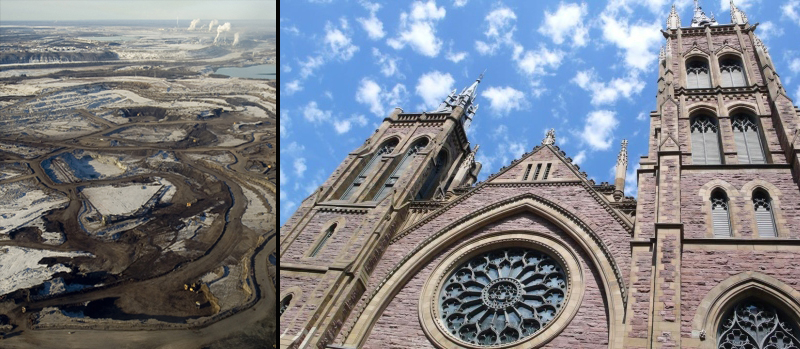Support strong Canadian climate journalism for 2025
The United Church of Canada voted to sell off fossil fuel assets worth $5.9 million and instead pump funds into renewable energy co-operatives in a landmark decision on Aug. 11.
The assets, which include holdings in 200 of the world’s largest fossil fuel companies, amount to 4.7 per cent of the United Church’s treasury and their selling off is the final result of a 20-year push for climate action.
“Care for creation and concern for the way that climate is impacting the most marginalized populations made this move an act of justice, of faith, and of solidarity with First Nations and other impacted communities,” said Christine Boyle, General Council commissioner for the United Church and a veteran climate advocate.
Her words echoed those written in Pope Francis’s landmark Encyclical released on June 18, which condemned ecological destruction and the impact of global warming on the world’s poorest people, adding that the Pontiff linked the issues of both economic and climate justice “in a way that this divestment movement does.”
"The United Church of Canada has voiced its concern about human-induced climate catastrophe for decades. Given the lack of political and industrial leadership to address climate concerns in a way that matches the scale of the problem, we wanted to signal that we are so serious about averting climate crisis that we are willing to put our money where our mouth is,” said Boyle.
The move to divest is also a reflection of United Church congregants who will be voting on Oct. 19, as Boyle said that they wanted leadership from all levels of government regarding climate change and environmental justice.
In her view, a new Canadian government after Oct. 19 would need to unveil a new energy strategy that respects First Nation land and title rights, as well as providing skills training for workers currently employed by the fossil fuels sector, in order to allow a smooth transition to ‘green collar’ jobs.
Such an approach would be a sea change from the approach currently pursued by Stephen Harper’s government, which has pressed ahead with oil sands development and gutted environmental protections of Canada's lakes and rivers, all the while gagging federal scientists to stop the release of data that may contradict the Conservatives’ agenda.
“I think that the United Church's decision to divest is powerful shot in the arm for the Canadian climate movement going into this election. The United Church is a major institution that agrees with the simple fact that the majority of the world’s fossil fuel reserves, including Canada's tar sands, need to stay in the ground and their decision makes it even more ridiculous that no Canadian political party is putting forward climate policies that acknowledge this,” said Cam Fenton, tar sands organizer at 350.org.
But he did not expect Harper's approach to environmental issues or oil sands development to change any time soon.
“So far the response from Stephen Harper and the fossil fuel industry to the growing momentum to actions like this (United Church divestment) has been to dig in even further on their support for tar sands and other fossil fuels,” said Fenton.
While Fenton said that a lack of political leadership did not matter so much as civic institutions take charge, Boyle voiced the fears of many young Canadians who face a potentially grim future of atmospheric pollution, extreme weather, and the threat of rising sea levels caused by greenhouse gas emissions.
“As a young person I would say ‘take my future seriously. Don’t bat this down the road,” said Boyle, when asked what she would say to Stephen Harper.
The United Church’s divestment drive was also welcomed by Audrey Depault, national manager of the Climate Reality Project, who was even happier that church assets will now be invested in renewable energy development.
“Keep in mind that the clean technology sector grew four times as fast as the overall Canadian economy between 2012 and 2013. The United Church’s decision is not only smart from the environmental point of view, it makes economic sense,” said Depault.
Nonetheless, Fenton said that a clear moral line in the sand has been drawn for other institutions such as the Universities of British Columbia (UBC), Toronto, and McGill, all of whom face decisions this fall on whether or not to divest from fossil fuels.
Support for divestment is already mounting on UBC's campus, as students, staff, and faculty members push for a green shift, helped along by backing from local community figures including deputy mayor Andrea Reimer and MLA David Eby.
Juno Award-winning musician and Vancouverite Dan Mangan has also lent his backing, saying that "As a UBC alumnus, I’d hope that the university is keeping with the more forward thinking higher learning institutions, and perhaps daring enough to lead the pack with climate change policies like divestment. The tables are turning."
PhD student Alex Hemingway, spokesperson for Divest UBC, felt that an institution like UBC would send a "powerful message," about the urgency of tackling climate change and the importance of putting words into action.
“We have a responsibility to act. If we want to see Canada become a climate policy leader, rather than an internationally-blamed obstacle, we have to be leaders, too. That’s why Divest UBC is now expanding and building upon its community outreach efforts,” said Hemingway. Expect to hear more from us.”




Comments